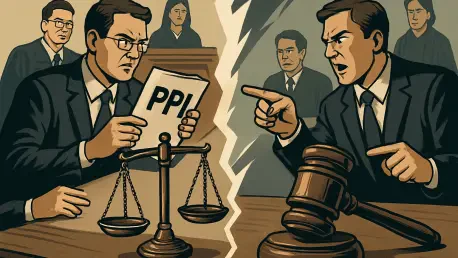I’m thrilled to sit down with Simon Glairy, a distinguished expert in insurance and Insurtech, with a deep focus on risk management and AI-driven risk assessment. With his extensive experience in the UK financial sector, Simon is the perfect person to guide us through the complexities of a recent high-profile legal battle involving AXA and Santander over the infamous payment protection insurance (PPI) scandal. In this interview, we’ll explore the intricacies of the dispute, the implications of the High Court’s ruling, the broader impact on the financial industry, and the critical lessons about managing legacy liabilities in corporate acquisitions.
Can you walk us through the background of this legal battle between AXA and Santander over the PPI scandal?
Absolutely, Abigail. This case revolves around payment protection insurance, or PPI, which became one of the UK’s biggest financial scandals. The dispute specifically concerns policies underwritten by units of Genworth, which AXA acquired in 2015. These policies were sold through GE Capital Bank, a business Santander took over in 2009. The core issue was who should bear the financial burden of the liabilities tied to these policies, especially after hundreds of thousands of customer complaints surfaced. AXA argued they inherited significant obligations with the Genworth acquisition, while Santander’s involvement came through their purchase of GE Capital’s operations. It’s a classic example of legacy issues resurfacing years after corporate deals are done.
What can you tell us about the scale of the PPI issue in this particular lawsuit?
The scale is staggering. This case alone involved over 650,000 customer complaints related to PPI products. That’s just a fraction of the broader scandal, which has cost the UK financial industry upwards of £40 billion in compensation. PPI was often mis-sold to customers who didn’t need or couldn’t use it, and the fallout has been a long, painful process of redress. This lawsuit highlights how deeply embedded these issues are in the sector, affecting not just banks but insurers and other entities caught in the chain of acquisitions.
How did AXA position themselves in this legal fight, and what were their key arguments?
AXA’s stance was that when they acquired Genworth’s units, they also took on massive liabilities tied to these PPI policies. They claimed to have already paid out nearly £500 million in consumer redress, plus another £70 million in costs related to ombudsman processes. Their argument was essentially that they shouldn’t be left holding the bag for issues stemming from before their acquisition, and they sought indemnification from Santander under existing agreements. It was a bold move to push for accountability from another major player in the chain.
What was the outcome of the High Court’s ruling, and what does it mean for AXA financially?
The High Court ruled in AXA’s favor, with the judge deciding they were entitled to seek compensation from Santander for the payments they’d made. The ruling was valued at around £675 million, which is a huge win for AXA. However, it’s not the full amount they’ll pocket—due to separate arrangements with Genworth, AXA will receive only a portion of that sum. Still, it’s a significant vindication for them after years of litigation and a clear signal that courts are willing to enforce indemnity claims in these complex acquisition scenarios.
How has Santander reacted to this decision, and what are their next steps?
Santander didn’t take the ruling lightly. They’ve publicly stated their disagreement with the outcome and are planning to appeal. Their position is that the net financial impact won’t be material to their business, thanks to provisions they’ve already set aside and other potential legal avenues they might pursue. They’ve also emphasized that no customers have been harmed by this specific claim or the judgment, and past redress for PPI complaints remains unaffected. It’s clear they’re not ready to concede just yet.
Can you shed light on Genworth’s role in this case and how they’re connected to the outcome?
Genworth is central to the origin of this mess since their units underwrote the PPI policies in question before AXA acquired them. Interestingly, Genworth stands to benefit if the ruling holds up. They’ve indicated they could recover around $750 million, or roughly £560 million, from AXA under their own agreement. They’ve been clear that this potential windfall wasn’t factored into their financial planning, so any recovery would be a bonus directed toward strategic priorities like debt reduction or share repurchases.
What broader lessons do you think the financial industry can learn from this ruling?
This case is a wake-up call for the industry about the risks tied to legacy product portfolios in acquisitions. It shows how liabilities from decades-old products like PPI can haunt companies long after the deals are signed. It also underscores the critical need for thorough due diligence before acquiring a business. Companies must dig deep into potential long-tail exposures and ensure robust indemnity frameworks are in place. Without that, you’re essentially buying a ticking time bomb, as AXA and Santander have learned the hard way.
Looking ahead, what is your forecast for the impact of such legal battles on the insurance and banking sectors?
I think we’re going to see even more scrutiny around legacy liabilities in the coming years. As financial institutions continue to consolidate through mergers and acquisitions, disputes like this will likely become more common. The PPI scandal may be the poster child, but other mis-sold products or hidden risks could surface. My forecast is that both insurers and banks will invest heavily in risk assessment tools—especially AI-driven ones—to better predict and mitigate these exposures before they escalate into courtroom dramas. It’s also likely that regulators will push for stricter disclosure requirements during acquisitions to prevent these kinds of disputes from dragging on for years.









